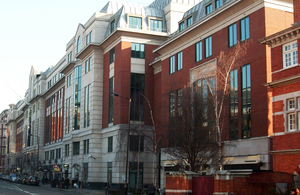Save money on your holiday driving
Holidaymakers can save money by using smarter driving techniques.

As families get ready to head off on their summer holidays, drivers were reminded today (26 July 2011) by Transport Minister Norman Baker of the savings they can make from adopting smarter driving techniques.
Smarter driving techniques include simple actions like driving smoothly, changing gears at the right time and clearing out clutter from the car. Following these driving techniques could save drivers 8% or even more, on their fuel costs.
Norman Baker said:
For many families, the annual holiday will be the longest trip they make all year. Applying the simple smarter driving techniques could make a real difference to fuel costs. In a single 500 mile trip, you could save £10 - certainly enough for a few extra ice creams to keep the kids happy!
Useful smarter driving tips for a holiday trip include:
Check your tyre pressures. Remember to check your tyre pressures before leaving home. Underinflated tyres are not only dangerous but also increase fuel consumption. Tyre pressures should be checked regularly throughout the year but this is particularly important if you’re planning a long journey with a heavily loaded car as this will put additional stress on your tyres.
Watch your speed. Fuel consumption increases dramatically with speed: At 85mph a car uses approximately 25% more fuel than at 70mph, and at 70mph approximately 10% more than at 60mph. So try to leave plenty of time for your journey, consider breaking a long journey overnight, and take plenty of on-board entertainment for the kids to reduce the pressure to arrive quickly.
Consider how you use roof racks and roof boxes. At motorway speeds a roof box can increase fuel consumption by around 25%. So if you’re using a roof box it’s particularly important to try to keep your speed down. And when you reach your destination consider taking the box off if you’re not going to need it until your return journey.
Avoid congestion. Traffic jams may leave you fuming and will also increase your fuel consumption. So plan your journey well and perhaps avoid travelling at times when traffic is likely to be particularly heavy, such as Friday afternoons or the first day of the school holiday.
Other key tips that apply year-round:
- when accelerating, change up through the gears early, usually by 2000rpm.
- and remember that when driving in town most fuel is used in accelerating a vehicle so try to anticipate well ahead and drive as smoothly as possible to avoid unnecessary acceleration and braking.
- drivers could brush up on their smarter driving techniques with a quick lesson. Many driving instructors and schools now offer smarter driving, or eco-driving, training to experienced drivers.
Notes to editors
Following the smarter driving tips on Directgov can save around 8% on fuel costs, and reduce a car’s CO2 emissions by the same percentage. There is the potential for even higher savings; evidence from practical training delivered by the Energy Saving Trust indicate that drivers achieve an average 15% improvement in fuel efficiency immediately following a lesson.
The Department for Transport supports smarter driving training by providing funding to the Energy Saving Trust to offer subsidised training to groups of drivers through their employers. Local authorities have also been encouraged to support smarter driving training in their areas, including in bids made to the Local Sustainable Transport Fund.
Further advice on smarter driving can be found on Directgov under Driving your car: green tips or on the Energy Saving Trust website, which also includes a video clip of smarter driving training.
There is also a free online service Find your nearest fully-qualified driving instructor
Roads media enquiries
Media enquiries 0300 7777 878
Switchboard 0300 330 3000